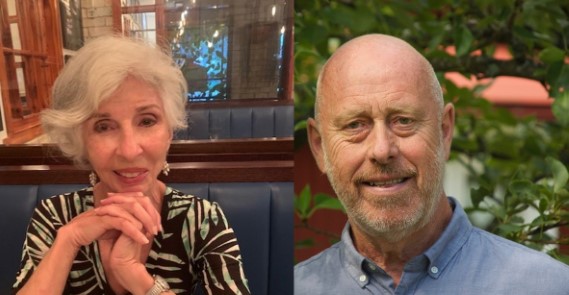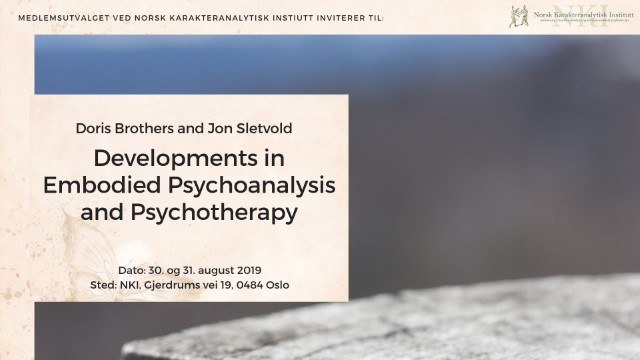30.08.2024: Resistance or the lack of freedom to change?
31.08.2024: The need NOT to know
More information in English is provided below.
Medlemsutvalget ved NKI har den udelte gleden av å invitere leger og psykologer til et nytt stedlig arrangement med Doris Brothers og Jon Sletvold, i forbindelse med deres pågående utvikling av fagfeltet innenfor kroppsorientert psykoterapi/psykoanalyse og traumeforståelse. Brothers og Sletvold har nylig gitt ut boken «Talking Bodies» (2023), og videreutvikler sitt arbeid i den kommende boken «Relational Knowing». Dagene vies til dypdykk i nye måter å betrakte fenomener motstand og dissosiasjon på.
Denne workshop er godkjent som 16 timers vedlikeholdskurs av Psykologforeningen.
Doris Brothers (PhD) er en anerkjent internasjonal kliniker med en lang karriere som psykoterapeut. Hun har gjennom flere tiår publisert en mengde faglige artikler og har flere bokutgivelser innenfor nedslagsfeltet mellom traumearbeid og relasjonell psykoanalyse.
Jon Sletvold (psykologspesialist og karakteranalytiker) har arbeidet med videreutvikling av karakteranalytisk og kroppsorientert psykoterapi både i Norge og internasjonalt, og har blant annet gitt ut boken «The Embodied Analyst» (2014).
I de senere årene har Doris Brothers og Jon Sletvold vært faglig aktive internasjonalt og på tvers av kontinentene, i form av veiledningsgrupper i kroppsorientert psykoterapeutisk tilnærming for klinikere. De fletter sammen arven etter Wilhelm Reich i moderne relasjonell psykoterapeutisk tilnærming, med støtte i nevrobiologisk forskning.
August 30, 2024: Resistance or the Lack of Freedom to Change?
This workshop is based on a chapter in our recently published book, “A New Vision of Psychoanalytic Theory, Practice and Supervision: TALKING BODIES”. We examine a possible reason for the wrenching difficulty so often encountered in attaining therapeutic change: desirable as it might seem to be, the sense of being free to change, a necessary component of agency, is often experienced as terrifyingly fraught with danger. This conceptualization has led us to offer an alternative understanding of what has been termed “resistance” by Freud, Reich and many other psychoanalytic writers. Drawing on Roger Frie’s understanding that agency is fundamentally embodied, we attempt to show that the fear of therapeutic change may be alleviated or even eliminated through embodied connectedness or the development of a sense of we-ness.
We also explore the lack of freedom to change experienced by patients whose constitutional make-up includes what we call “subtle neurological conditions” such as ADHD and high-functioning autism. We offer several illustrative clinical examples.
We end the day’s meeting with a demonstration of embodied supervision.
August 31, 2024: The Need NOT to Know.
This workshop is based on our forthcoming book: “A Psychoanalytic Perspective on the Pleasures, Perils and Power of Relational Knowing”. Dissociations, which we see as a powerful manifestation of the need not to know, has often been associated with trauma. In this workshop, we examine the need not to know more broadly as a pervasive aspect of being human that is not necessarily directly associated with trauma. We believe that most patients enter therapeutic relationships needing to keep aspects of themselves to themselves and that they are also likely to wish not to know some things about their analysts. Similarly, their analysts need not to know or be known.
The need not to know often accompanies anxiety about having the feelings that knowing or being known might generate. Shame, we have found, is chief among them. We offer several clinical examples including one that highlights the embodiment of shame and the need not to know.
We also end this day’s meeting with a demonstration of embodied supervision.
Pris og påmelding
- Ordinær pris for begge dager: 6000 kr (3000 kr for kandidater ved instituttet)
- Ordinær pris for en valgfri dag: 4000 kr (2000 kr for kandidater ved instituttet)
Lett servering i pausene er inklusivt i prisen.

